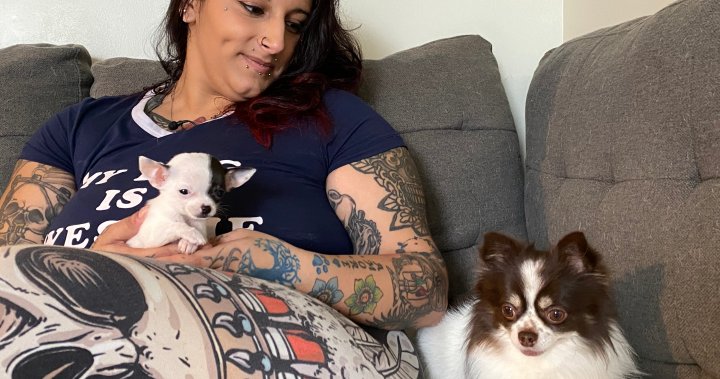It’s that time of year again — when the chances of seeing an ad for a weight loss program, a fitness app, or a company that wants to help you transform your body are even higher than usual.
Much of this messaging stems from what’s known as diet culture.
“For me, diet culture is mostly about forcing people to look a certain way, forcing people to fit into a colonial standard of beauty,” said Amirah Oyesegun, a recent UPEI foods and nutrition graduate and dietitian-in-training on P.E.I.

Diet culture, Oyesegun said, focuses more on your looks and weight rather than your overall health and well-being.
So, how can we better recognize and challenge diet culture?
Seeing it for what it is
It can be a challenge to notice, especially because of how diet culture is often presented.
“The issue is diet culture is often packaged as health. And so that’s where the problem is,” said Oyesegun, whose pronouns are they/them.
They said diet culture shows up in every client they have, even people whose health issues aren’t related to weight loss.
“They still believe weight loss is the solution. Weight loss isn’t necessarily the solution to all health problems.”
Katharine MacDonald first started looking into the body positivity and anti-diet culture movement after having a stillbirth in 2013.
“That was kind of a traumatic experience, and it produced a change in my body,” said MacDonald, who is originally from Charlottetown and now lives in Halifax.
“I just kind of started down this path of, like, looking toward diversifying the kind of media that I was consuming, because I wanted to see more body types.”
I just started choosing to consume media that felt representative to me … body types that were larger than mine, more folks who are disabled, racialized bodies.— Katharine MacDonald
MacDonald said advertisers have gotten better at trying to sell diet culture “under the guise of health and wellness.”
“But ultimately, if it’s all centred on weight loss … it is still rooted in anti-fatness, essentially.”
Consider mental health when making goals
Oyesegun reminds clients to be compassionate to themselves.
“Being healthy also includes your mental health,” they said.
“If you force yourself and you’re starving yourself to be in a smaller body and your mental health is not doing very well, then you’re not healthy overall.”

It’s something Amila Topic, a personal trainer, also thinks about.
“We need to look at the whole person, their mental and emotional well-being as well as their physical,” said Topic, who is also the owner of Kinetic Fitness in Charlottetown,
Many of her clients try to change two big things when the new year rolls around: their eating and fitness habits.
“With those two changes, to really make long-lasting positive changes in a person’s life, we also need to look at their work and life stressors, how much sleep they’re getting, what their personal life looks like,” she said.
“I love to discuss … what’s realistic, what will help them feel good short term and long term.”
Why is weight loss the goal?
There’s nothing inherently wrong with wanting to lose weight — it all depends on your reasons why, said Topic.
“I like to ask, you know, ‘Is losing 20 pounds something that’s going to make you feel happy? Or is that something that long-term is sustainable?'” she said.
She encourages her clients to consider other goals.
“Can I make myself stronger, more mobile? Maybe start a weightlifting program and then allow that weight loss goal to be sort of a secondary goal?”

But Topic said she tries not to dismiss weight loss goals entirely. She said she’s noticed “a huge pendulum swing” in the fitness industry away from esthetic goals to the point where it’s frowned upon to voice them at all.
“I try to validate the fact that somebody has that goal. And then I just try to question,” she said.
Change up your social media feed
Being surrounded by images of one type of thin body can be challenging if that’s not what you look like.
“As a millennial woman, you know, you grow up with, like, The Biggest Loser on TV and … pointed images of thinness everywhere that you look,” MacDonald said.
If you’re struggling with diet culture, she recommended seeking out a broader diversity of bodies on social media, something she did several years ago.
“Body types that were larger than mine, more folks who are disabled, racialized bodies, like, I just wanted to see more diversity in general, and I felt like that would serve me better.”
Is losing 20 pounds something that’s going to make you feel happy? Or is that something that long-term is sustainable?— Amila Topic, owner of Kinetic Fitness
The change helped her to accept her own body and judge others less.
“When people are given representation that they deserve … people are less likely to be judgmental toward others,” she said.
Topic, as the owner of a fitness business, also hopes to be part of the solution rather than part of the problem.
“Fitness businesses and health businesses can do a lot better job at having more representation in their social media and in their media in general,” she said.
“We definitely fall into the category of a business that could do better, too.”
If someone in your life makes comments about your body, talk to them
MacDonald said she and her two sisters had a conversation with their mom about the way she spoke about their bodies.
“We’ve had to kind of say, ‘Look, we know that when you talk to us about our bodies, that it is coming from a place of love, but it’s also rooted in some problematic ideas about bodies and health,'” said MacDonald.
“‘Even if you want to compliment us on our weight or appearance, it’s still going to feed into a narrative that overall that how we look matters and that our appearance is important.'”
At first, her mom found it hard to hear.
“Having a frank conversation about it might be a little difficult. But I know that a lot of my peers, a lot of, especially women, in their 20s and 30s, have had to have this kind of talk with their parents,” MacDonald said.
Disconnecting from diet culture is a process
This change won’t happen overnight, said MacDonald.
“Understanding the way that fatphobia or anti-fatness seeps into our lives, and then … improving acceptance of your own body and of other bodies is definitely a process,” she said.
“It’s not a quick and easy thing.”
Oyesegun agreed, saying that switching your thought process is challenging.
“It is hard, because diet culture has been associated with health for so long.”







More Stories
Ontario NDP will defy keffiyeh ban if Ford doesn’t step in and end it, says party leader | CBC News
‘Tremendous help’: Hundreds of new shelter spaces coming to Abbotsford – BC | Globalnews.ca
Heroic stranger braves the cold Calgary river water to rescue missing pup – Calgary | Globalnews.ca